Optimal Nutrition for Cockatiels: A Comprehensive Guide
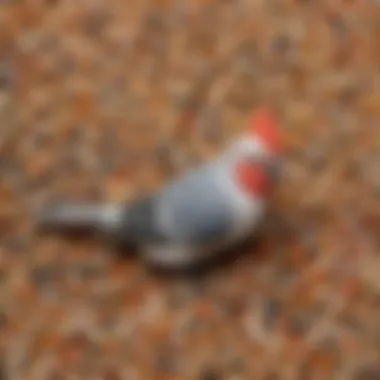
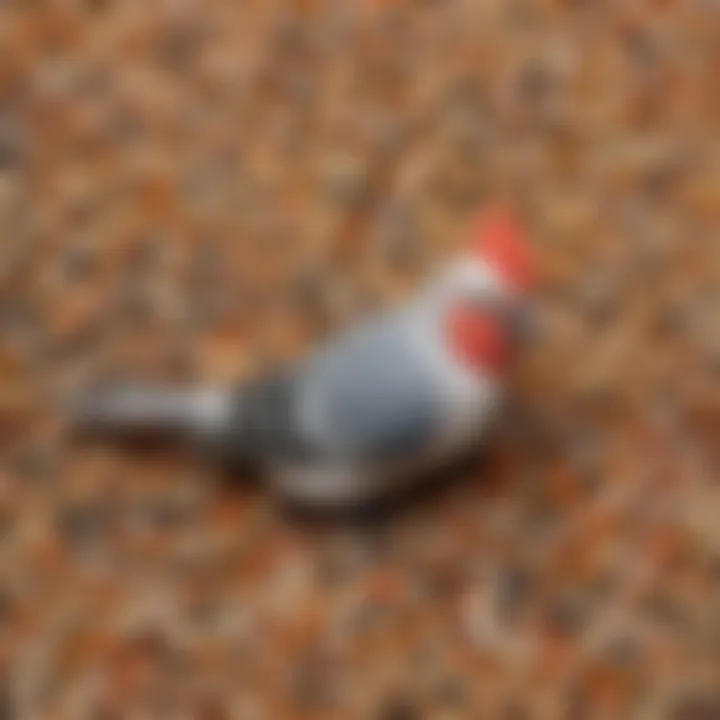
Intro
Feeding your cockatiel the right way is such an intricate balance, much akin to walking a tightrope. These lively parrots, often recognized for their charming whistles and bright colors, have unique nutritional needs that shouldn’t be overlooked. The importance of understanding what goes into their beaks varies not just by their individual preferences but also by their health and well-being.
A well-rounded diet is crucial; after all, what goes into one’s body reflects on their mood and energy levels, and our feathered friends are no different. This guide looks to illuminate essential knowledge about cockatiel diet, including recommended food types and essential nutritional needs. The aim here is to arm pet owners with tools and insights to ensure their avian companions thrive, avoiding the pitfalls that can lead to health issues.
Understanding Your Pet
Feeding our feathered friends effectively begins with comprehending them on a fundamental level. Each cockatiel has its peculiar behaviors and quirks that intricately tie into their dietary preferences. Without this understanding, one might inadvertently offer something that does more harm than good.
Pet Behavior Basics
Cockatiels communicate through a delightful mix of chirps and whistles, showcasing their moods and desires. Did you know that an unhappy cockatiel may refuse food or exhibit signs of stress? Observing behavior closely can provide clues to their nutritional preferences.
- Happy Cockatiels: Often vocal, active, and inquisitive; they’ll try new foods.
- Stressed or Unhappy Cockatiels: May withdraw, vocalize less, or leave food untouched.
Understanding these signals can guide you in identifying dietary changes or preferences.
Common Breed Characteristics
Cockatiels are known for their distinct personalities, shaped by factors like age, breeding, and social environment. Not every bird will behave alike, though. Some may favor seeds while others thrive on fruits and veggies. It's also important to note that some cockatiels display food preferences based on their life stage — younger birds might lean towards experimental eating, while older ones may develop specific favorites based on past experiences or health changes.
Species-Specific Needs
Cockatiels, as a species, require a balanced diet that includes seeds, pellets, and fresh foods. However, it’s more nuanced than just what they’ll eat; different age groups and even individual health conditions necessitate tailored diets. For example:
- Young Cockatiels: Need higher protein levels for growth.
- Breeding Pairs: Require added calcium for healthier eggs.
- Senior Cockatiels: Might need softer foods as their beaks become less adept at cracking seeds.
“Feeding is not merely a responsibility; it's an understanding of unique needs.”
By recognizing these differences and adjusting accordingly, you set the stage for a long and happy life for your cockatiel.
Overall, nurturing your cockatiel’s unique dietary requirements starts with awareness of their behaviors and characteristics. Understanding these basics provides a strong foundation for selecting the optimal foods that will not just sustain but enhance the lives of these amazing pets.
Understanding Cockatiel Nutrition
When it comes to caring for your cockatiel, nutrition stands as the cornerstone of its health and vitality. Just like any living being, cockatiels require a carefully thought-out diet to thrive. Understanding cockatiel nutrition is more than just knowing what to feed them; it’s about comprehending the specific dietary requirements that ensure a long and happy life for these charming birds.
The Importance of a Balanced Diet
An ideal diet for cockatiels must be balanced, combining various food types to provide optimal health. A balanced diet serves not only to fulfill basic nutritional requirements but also to prevent common health issues such as obesity or malnutrition. Poor dietary choices can lead to a myriad of problems, including feathers that lack luster, poor vocalization, and even behavioral issues. A well-fed cockatiel is generally more active and exhibits a brighter mood, making it essential for owners to pay attention to the food they provide.
Key Nutritional Components
To comprehend the nuances of cockatiel nutrition, it's essential to break down the key components that make up a nutritious meal. This section highlights four critical elements: Proteins, Fats, Vitamins, and Minerals.
Proteins
Proteins are the building blocks of life and play a crucial role in muscle development and overall body function. For cockatiels, proteins help maintain healthy feathers and support their immune system. High-quality protein sources come from a variety of foods, including various seeds, legumes, and certain grains. It's worth noting that while some eastern diets focus heavily on seeds, integrating legumes can provide a broader range of essential amino acids that aids overall health and well-being. However, an excess of protein can lead to obesity in birds, especially if they are not sufficiently active.
Fats
Fats provide a concentrated source of energy, essential for cockatiels that engage in more physical activities like flying or playing. These birds utilize fats for energy metabolism and maintaining healthy skin and feathers. Specific fats, such as omega-3 fatty acids found in flaxseeds or fish oil, can contribute positively to a bird's health by promoting feather growth and overall vitality. Nevertheless, too much fat can result in weight gain, which may lead to potential health issues down the line.
Vitamins
Vitamins are fundamental for countless bodily functions, from vision to bone health. For cockatiels, the Vitamins A, D, and E are particularly vital. Vitamin A, for example, is crucial for maintaining healthy eyesight and immune function, while Vitamin D, often obtained from sunlight, plays a significant role in calcium absorption. A bird deprived of necessary vitamins can face severe health issues that may take significant time and resources to rectify. However, it's essential to avoid over-supplementation, as this can lead to toxicity and other related health issues.
Minerals
Minerals are vital for many bodily processes, including muscle function and bone strength. Elements such as calcium and phosphorus should be included in a cockatiel’s diet to support healthy skeletal structure and general well-being. Calcium, in particular, is critical for breeding females, whose needs increase during egg-laying periods. Sources of minerals can often be found in fortified pellets, leafy greens, and some seeds. Notably, a lack of minerals in a diet can cause serious health problems, but excessive mineral intake can lead to complications like metabolic bone disease.
"An understanding of nutrition is integral to fostering health and happiness in cockatiels, allowing these wonderful companions to live fulfilled lives."
By comprehensively exploring these nutritional components, pet owners can create a balanced diet that not only supports the physical well-being of their cockatiels but also enriches their vibrant personalities in the long run.
Bird Seed Mixes for Cockatiels
Bird seed mixes are a crucial staple in the diet of cockatiels, making them not just a tasty treat but also a vital source of health and nutrition. When you’re looking to pamper your feathered friend, understanding which seeds work best can feel like navigating through a maze. The right selection can enhance your bird's quality of life while keeping them lively and agile.
Seed mixes usually consist of a variety of seeds and grains that cater to the specific dietary needs of cockatiels. These birds are known for being seeds lovers, and a well-rounded seed mix offers the necessary fats, proteins, and other nutrients they require. However, not all seed mixes are created equal. Collision courses with low-quality products can lead to health issues down the road, which is why an informed choice is so vital.
Types of Seeds and Grains
Sunflower Seeds
Sunflower seeds seem to be the darling of many birdies, and it's not hard to see why. These seeds are packed with healthy fats and oils that provide a quick energy burst, essential for an active bird. One significant aspect of sunflower seeds is their high caloric content, which can be great for cockatiels needing an energy boost.
However, it’s essential to offer them in moderation. Too many sunflower seeds can lead to obesity, resulting in health concerns later. The distinct shape of these seeds makes them easy for cockatiels to pick and enjoy, and their crunchy texture adds a bit of fun to snack time.
Millet
Millet is another crowd-pleaser, especially when it comes to being a safe bet for your cockatiel’s seed mix. This tiny, round seed not only has a taste that birds find appealing but also contains protein and fiber, aiding in digestion. One of millet’s strengths is that it's gentle on the stomach, making it an excellent option for younger birds or those recovering from illness.
Additionally, it’s often included in many basic seed mixes designed for cockatiels. Yet, millet lacks the range of nutrients found in some other seeds, so it’s wise to mix it with other seed types to create a balanced meal.
Canary Seed
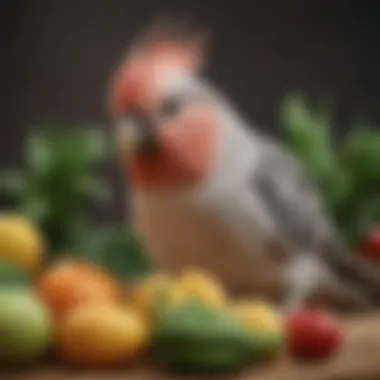
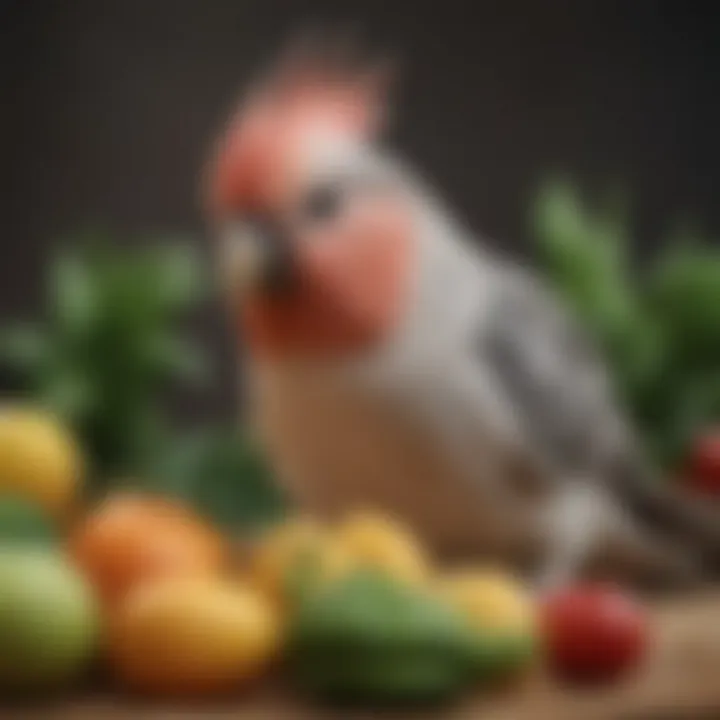
Canary seed doesn't just belong to canaries! This seed has a fine edge with its lower fat content compared to some of the more popular choices. It's actually high in carbohydrates and essential oils, giving it a special place in a cockatiel’s diet. Canary seeds can support good health while also being a favorite treat.
Unique to canary seeds is their mild flavor, which does well to entice cockatiels that may be wary of stronger tastes. These seeds can be included without fear of causing weight issues, yet they shouldn't be the sole component of your bird's diet due to their lack of certain essential nutrients.
Oat Groats
Oat groats, the hulled grains of oats, might be a bit less common in the average seed mix but are an outstanding addition nonetheless. They are rich in fiber, which helps maintain a healthy digestive system for your cockatiel. Oat groats also provide long-lasting energy, making them a sensible choice.
What sets oat groats apart is their versatility. They can be offered raw or cooked as a part of a fresh meal along with other grains or veggies. However, since they’re not as palatable to some birds compared to seeds with stronger flavors, they should be mixed with seeds that cockatiels love to keep the dining experience enjoyable.
Choosing the Right Seed Mix
When you walk down the pet store aisle filled with various seed mixes, it can be overwhelming. The key is to find a mix that contains a variety of seeds, rather than just one or two types. You want a mix that complements your cockatiel’s food exploration while promoting good health.
- Look for mixes that contain a mix of sunflower seeds, millet, canary seed, and oat groats.
- Consider your bird’s personal preferences as well as their specific health needs.
- Regularly rotate the seed mix to keep their interest and meet their nutritional demands.
Finding the right balance in their diet can make all the difference in their happiness and well-being.
Fresh Fruits and Vegetables
Fresh fruits and vegetables are a cornerstone of optimal nutrition for cockatiels. These colorful and nutritious additions can significantly enhance their overall health and well-being. Not only do they offer essential vitamins and minerals, but they also add variety to a cockatiel's diet, making meals more exciting and flavorful.
Incorporating fresh produce helps to prevent dietary boredom, which can lead to various health issues. It also promotes natural behaviors like foraging, as cockatiels love to explore and learn new things, especially when it comes to food. Here, we'll delve into the benefits of fresh produce, recommended fruits, and vegetables that cockatiels enjoy.
Benefits of Fresh Produce
Fresh produce plays a vital role in a cockatiel's diet. These foods are rich in nutrients that support immune function, feather health, and overall vitality. Fruits and vegetables contain high levels of antioxidants, which help combat free radicals and keep a bird's body functioning optimally. They also provide hydration, especially in warmer weather, contributing to the bird's overall hydration without relying solely on water—though clean water is still crucial.
Moreover, the fibers found in fresh fruits and vegetables aid digestion, keeping the birds' digestive systems healthy and functioning efficiently.
Recommended Fruits
Apples
Apples, with their crisp texture and sweet flavor, are a popular choice for cockatiels. They are a fantastic source of vitamin C and dietary fiber. The moisture content is an added bonus, providing excellent hydration. However, it's important to remove the seeds as they contain cyanide, which is harmful.
Key Characteristic:
Crisp and juicy, apples are appealing to even the pickiest of eaters.
Unique Feature:
Red apples tend to be sweeter, while green apples have a tart taste, offering options for different flavor preferences.
Advantage:
They encourage natural foraging behavior, making feeding time more enjoyable.
Carrots
Carrots bring a vibrant orange hue and a crunch that cockatiels often find irresistible. They are high in beta-carotene, which is essential for eye health and immune function. Plus, carrots can be offered raw or cooked, depending on the bird's preference.
Key Characteristic:
Rich in vitamins, carrots support overall health.
Unique Feature:
Their high fiber content aids good digestion.
Advantage:
They can be chopped, shredded, or grated, offering variety in how they are presented.
Bananas
Bananas are yet another good option for cockatiels. Soft and sweet, they provide potassium and vitamins C and B6. Their unique texture can be appealing and help in encouraging a varied diet.
Key Characteristic:
High in calories, bananas can be an energy boost, especially for active cockatiels.
Unique Feature:
They're easy to chew, making them a safe choice for young or elderly birds.
Advantage:
Cockatiels may find them more palatable compared to drier options or tougher vegetables.
Berries
Berries, such as strawberries, blueberries, and raspberries, are nutrient-dense and full of antioxidants. They can be a delightful treat for cockatiels and are often highly sought after by them.
Key Characteristic:
Low in calories but high in nutrients, making them excellent for weight management.
Unique Feature:
Their vibrant colors can attract cockatiels and stimulate interest in feeding.
Advantage:
They can be offered fresh, mashed, or frozen, allowing for experimentation with textures.
Vegetables That Cockatiels Enjoy
A variety of vegetables can be included in their diet, providing essential nutrients. Just like fruits, vegetables need to be fresh, raw, and ideally organic. Here are some favorites.
Spinach
Spinach is a leafy green that's packed with vitamins A, C, and K. It's a good source of iron, supporting overall health and muscle function.
Key Characteristic:
Healthy and light; often preferred by many birds.
Unique Feature:
Sometimes, it can be a bit high in oxalic acid, which can bind calcium in the body, so it's recommended to serve it in moderation.
Advantage:
It can be chopped into smaller pieces or served whole, offering flexibility in presentation.
Broccoli
Broccoli is full of beneficial nutrients and has the added benefit of being a natural source of calcium. Cockatiels often enjoy nibbling on the green florets, and it makes a colorful addition to their diet.
Key Characteristic:
Versatile and easy to prepare; can be offered raw or lightly steamed.
Unique Feature:
The florets can stimulate a cockatiel’s natural foraging instinct.
Advantage:
It's thought to be a good immune booster due to its high content of vitamins.
Bell Peppers
Bell peppers come in various colors – green, yellow, orange and red – each offering different levels of vitamins. They provide a moderate amount of vitamin C and are often enjoyed by cockatiels.
Key Characteristic:
Crunchy and sweet, appealing to a range of tastes.
Unique Feature:
The vibrant colors make feeding visually stimulating for cockatiels.
Advantage:
These can be fed raw and sliced into strips, encouraging exploration and curiosity.
Kale
Kale is often touted as a superfood. It’s rich in fiber, calcium, and various vitamins, making it an excellent addition to a cockatiel's diet.
Key Characteristic:
Nutrient-dense, it can support bone health due to its calcium levels.
Unique Feature:
While great for nutrition, some cockatiels may find the tough texture less appealing, so it is wise to introduce it gradually.
Advantage:
Highly adaptable, kale can be offered fresh, dried or cooked in minimal amounts, allowing you to see what your pet prefers.
Commercial Pellets and Foods
Feeding cockatiels involves much more than scattering seeds in a bowl. One significant aspect is the use of commercial pellets. These pellets can be a game changer in ensuring that your feathered friend gets all the nutrients they require for a vibrant and healthy life. They offer a balanced diet that can greatly enhance your cockatiel's overall wellness.
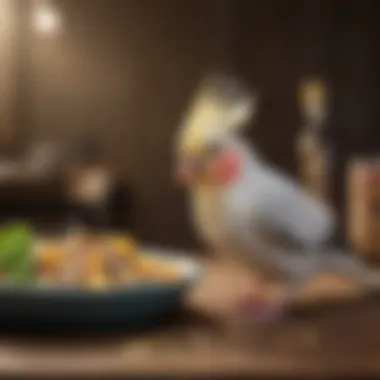
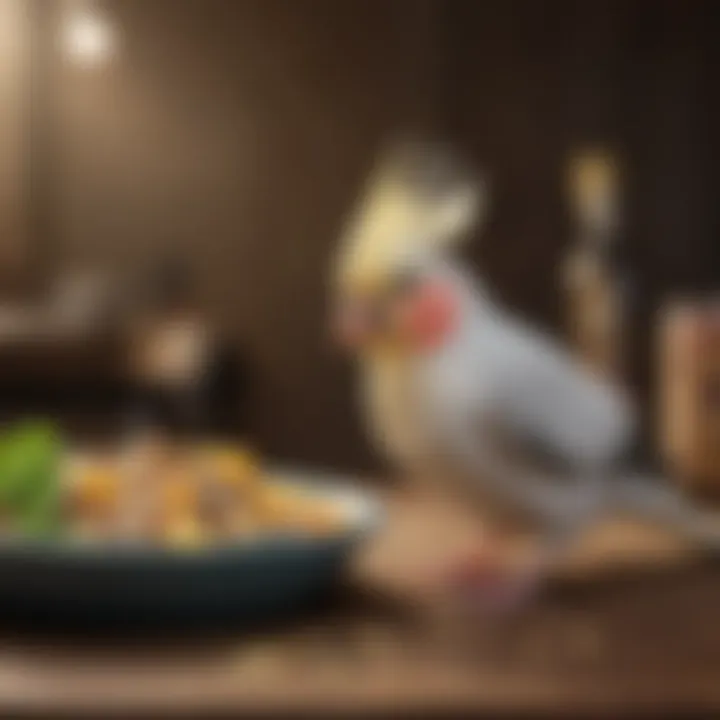
Understanding Pellets
Pellets are specifically formulated to meet the nutritional needs of cockatiels. Unlike seed mixes, which can be deficient in various vitamins and minerals, pellets contain a scientifically designed blend of proteins, fats, vitamins, and minerals in each bite. The main idea is simple: by providing a complete food source that meets their dietary needs, you help avoid nutritional deficiencies that can lead to health issues.
Pellets come in a range of shapes, sizes, and formulations. It’s important to select a type that not only fits the nutritional profile of your bird but also appeals to their taste. Many cockatiels may initially be hesitant to try pellets, especially if they are used to a seed-heavy diet. Just remember, patience is key here. Gradually introducing pellets alongside their favorite seeds can help make the transition smoother.
Evaluating Quality Brands
When you're deciding on commercial pellets, the old adage "you get what you pay for" rings true. Higher-quality brands prioritize the health and well-being of pet birds. Look for pellets that have clear labeling and a comprehensive ingredient list. The first few ingredients should ideally include wholesome items like whole grains, fruits, and vegetables. Avoid brands that rely heavily on fillers or artificial ingredients.
Some reputable brands to consider include Harrison's Bird Foods, Kaytee Exact, and Zupreem. These brands are commonly recommended among avian enthusiasts for their commitment to quality and nutrition.
While shopping, it’s also good practice to check for the freshness of the pellets. Expired or stale pellets won’t offer the nutrients your cockatiel needs and can even pose health risks.
"A well-nourished cockatiel can express its full personality, singing and chirping happily, while one with poor nutrition may become lethargic or irritable."
In summary, commercial pellets are an essential piece of the puzzle when it comes to providing adequate nutrition for your cockatiel. By understanding how they are made and knowing how to choose quality products, you can feel confident in your feeding choices that pave the way for a happy and healthy companion.
Treats for Cockatiels
The topic of treats for cockatiels is often neglected, yet it's a crucial part of understanding their overall nutrition. Treats not only serve as a tasty addition to their diet but also as tools for bonding and training. Providing appropriate treats can enhance your cockatiel's experience at home, contributing to their happiness and well-being.
When discussing treats, one must consider both the benefits and the potential risks involved. A properly selected treat can reinforce positive behavior and create a tangible way to communicate affection. However, overlooking the nutritional quality of these treats can lead to health issues. It's vital to strike a balance, ensuring that treats complement their diet without compromising it.
Healthy Treat Options
Nuts
Nuts are often hailed as a superfood for cockatiels. They are packed with healthy fats that are essential for maintaining energy levels and promoting feather health. Almonds, walnuts, and pine nuts are especially beneficial. Just like us, cockatiels can sometimes enjoy a little indulgence, and nuts provide an excellent source of protein and vitamins.
Moreover, feeding nuts in their shell can offer your bird an engaging activity, stimulating their beak and mind. But be cautious; too many nuts can lead to obesity due to their high-fat content. Moderation is the name of the game.
Seeds
Seeds are the classic go-to treat for many bird owners, and they hold a special place in the hearts of cockatiels. These tiny powerhouses are rich in essential fatty acids and protein, which contribute to a healthy plumage and robust body. Sunflower seeds are particularly popular among cockatiels, offering a delightful crunch that they love. However, it's important to monitor the amount you give. An all-seed diet can lead to nutrient imbalances, so seeds should be seen as a treat rather than the main course.
Dried Fruits
Dried fruits can be a fun and nutritious option for your cockatiel. They serve as a sweeter alternative to fresh fruits and deliver concentrated nutrients. For instance, dried apricots or figs can be particularly rich in vitamins and minerals. While dried fruits carry the unique benefit of being portable and long-lasting, they often come with added sugars. Always check for any extra sugar fluctuations in commercial dried fruit products. A little bit goes a long way, so use them thoughtfully in moderation.
Treats to Avoid
Processed Foods
Processed foods are a categorical no-go for cockatiels. Many commercial bird treats found in stores often have additives, preservatives, and sugars that are detrimental to their health. They might seem convenient, but the risks outweigh the tasty allure. Feeding your bird processed foods might expose them to health issues such as obesity or nutritional imbalances. Sticking to whole foods will ensure your cockatiel stays naturally healthy.
High-Sugar Items
High-sugar items, though tempting, can wreak havoc on a cockatiel's health. Treats that are laden with sugar can lead to weight gain, diabetes, and behavioral issues. Cockatiels are naturally inclined to sugary flavors due to their fruit-eating habits, but that doesn't mean it's good for them. Always be on the lookout for hidden sugars in the treats you offer.
Toxic Plants
It's easy to overlook what’s safe and what’s not when it comes to plants and treats. Some plants are downright toxic to cockatiels, and even small amounts can lead to severe health issues. Common household plants like avocado, chocolate, and certain types of lilies fall into this toxic category. Familiarize yourself with these no-go items, and make sure every scrumptious treat aligns with your cockatiel’s health needs.
"Cockatiels bring a dashboard of colors and sounds to our lives, but as guardians, it’s our duty to ensure their treats are as vibrant as they are, but with a touch of caution."
Being informed about healthy treat options and understanding what to avoid arms you with the knowledge to keep your cockatiel thriving. Treats can be a lovely way to connect with them, serving up joy while respecting their dietary needs.
Water: The Essential Component
Water is often underestimated yet is fundamental for the overall health and vitality of cockatiels. Just like humans, birds require a consistent intake of fresh, clean water to support their bodily functions. This necessity often gets overshadowed by the focus on seeds, fruits, and vegetables, which can lead one to overlook how essential water is for maintaining well-being.
Importance of Fresh Water
The significance of fresh water cannot be stressed enough. Cockatiels, being lively and social creatures, rely heavily on water to stay hydrated, especially since their diet may consist primarily of dry seeds that can be dehydrating. Water plays a key role in:
- Digestion: It aids in breaking down food, allowing nutrients to be absorbed effectively.
- Temperature Regulation: Birds can’t sweat, thus they rely on panting and drinking water to maintain their body temperature.
- Waste Excretion: Adequate water intake supports kidney function and helps in flushing out waste products.
These aspects are crucial in preventing problems like kidney disease and dehydration, which can occur when their water needs are not met. A cockatiel that has constant access to fresh water will generally display more active behavior and better overall health.
Providing Clean Water
Ensuring that your cockatiel has access to clean water is just as vital as providing water itself. Here are some practical considerations to keep in mind:
- Regular Changes: It's advisable to change the water daily. Stale water can harbor bacteria and harmful microorganisms that may affect your pet's health.
- Clean Containers: Regularly wash the drinking dish with soap and water. This prevents algae growth and keeps it free from food particles.
- Use Appropriate Bowls: Opt for shallow dishes that are easy for birds to drink from but deep enough to hold enough water. Look for non-porous materials that resist staining and bacteria buildup.
- Monitor Water Consumption: Note how much your cockatiel drinks. If you see significant changes in their water intake, this may signal health issues.
"Providing fresh and clean water can not only improve your pet's health but enhance their happiness, leading to a more engaging pet experience."
Additionally, some cockatiels might enjoy drinking from a water bottle, which can be a cleaner solution, though familiarity with the device is important.
In summary, proper hydration is just as essential as a nutritious diet when it comes to caring for cockatiels. Make it a habit to check on their water supply and ensure it remains fresh and clean, keeping your feathered friend in top health.
Considerations for Dietary Changes
Feeding a cockatiel requires careful thought, particularly when making dietary adjustments. Just like humans, these birds can experience the effects of a sudden change in nutrition. Therefore, taking the time to understand how to change their diet properly is essential for their well-being. This section will delve into the finer points surrounding dietary modifications, ensuring pet owners are well-informed.
Transitioning Foods
When it's time to mix things up for your cockatiel's menu, a gradual approach is key; abrupt changes can unsettle their systems, leading to droppings that are less than ideal. Start by integrating new foods slowly, mixing them with the usual diet. For instance, if you’re introducing a new type of pellet, you might begin with a measure of 25% new pellets to 75% old ones. Over a week, incrementally increase the new pellets until the ratio reaches 100%. This way, you can observe your cockatiel’s reaction along the way.
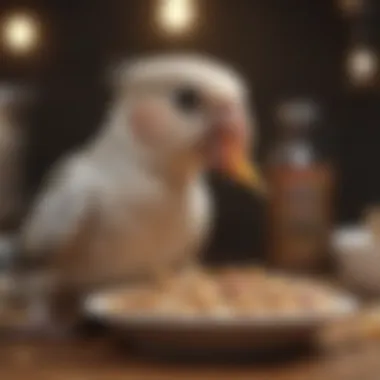
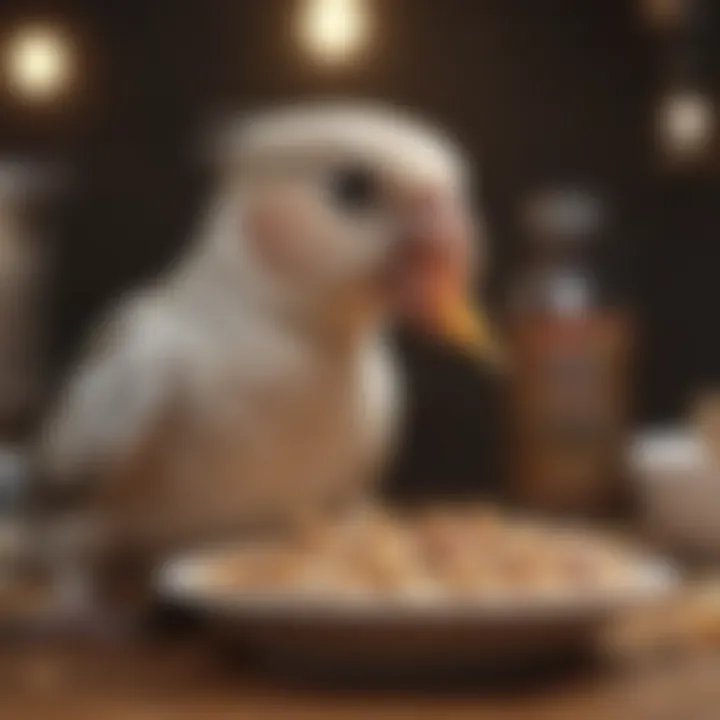
Familiarity is comforting for these birds. Their ability to adjust to new foods can vary, so keep an eye on their overall behavior and health during this transition. Monitor for signs of stress or rejection of the new items. Making changes at a relaxed pace ultimately fosters better acceptance of their new culinary treats.
Recognizing Dietary Issues
Sometimes, what’s served can lead to unexpected issues. As a pet owner, staying vigilant about your cockatiel's diet is vital. Changes in feather quality, temperament, or vocalization might suggest there's a dietary problem creeping in. Let’s break it down further into two significant considerations.
Avoiding Overfeeding
Overfeeding can silently become the villain in your cockatiel's tale. These birds can be prone to obesity, which can lead to more serious health problems down the line. A consistent feeding routine encourages healthy habits—measure their food portions instead of free-feeding. This keeps them active and their weight in check.
One key characteristic of avoiding overfeeding is portion control. It not only leads to a healthy bird but can also reduce the risk of liver disease, heart issues, and other weight-related ailments. By establishing portion guidelines specific for cockatiels, pet owners can ensure their feathered friends maintain a suitable body condition. Vegetable matter and fruits can be offered in moderation, enriching their diet while avoiding any adverse effects of overindulgence.
Identifying Food Allergies
Food allergies might be sneaky troublemakers that can surface among cockatiels. Observing any changes in behavior or gastrointestinal signs can help owners figure out potential allergies. Common culprits include seeds such as millet or even certain fruits, and being aware of this can save a lot of grief.
This aspect of recognizing food allergies highlights the importance of observing your cockatiel’s reactions when trying new foods. Changes in their feather condition, scratching, or digestive upsets might suggest something is amiss. Keeping a food diary could be a useful practice; a simple record can shed light on patterns and assist in pinpointing specific problems.
In summary, understand that diet changes should be approached with care. Not only can this help in promoting good health, but it reinforces the bond between a pet owner and their bird. As always, if any significant issues arise during the change, reaching out to a veterinarian for insight is a smart course of action.
"An ounce of prevention is worth a pound of cure."
By being attentive to these factors, you empower your cockatiel to thrive and enjoy a vibrant life.
Impact of Diet on Behavior
Understanding how nutrition affects the behavior of cockatiels is crucial for any pet owner. Many times, we might overlook the connection between what these birds eat and how they act. Just like in people, food influences mood, energy, and overall demeanor. A well-rounded diet can lead to a confident and friendly cockatiel while a poor diet may make your feathered friend irritable and reserved.
Influence of Nutrition on Temperament
The temperament of cockatiels can often be changed by adjusting their diet. For instance, a high-protein diet supports active and playful behavior. Proteins supply the building blocks for muscle and tissue, boosting the bird’s vitality. Conversely, a diet deficient in vitamins can result in lethargic and moody behavior.
You might notice your cockatiel becoming more sociable with the inclusion of fruits and vegetables rich in antioxidants. Foods such as spinach and bell peppers can not only improve overall health but may also uplift your cockatiel's mood. In this way, owners should be attentive to how their cockatiel's behavior changes in response to its diet. Little tweaks can result in a happy, chirpy companion.
"A bird's good mood often starts with the food on its plate."
Link Between Diet and Vocalization
Vocalization is a significant part of a cockatiel's identity. An interesting observation is that the diet impacts how vocal these birds are. For instance, cockatiels that eat a variety of seeds, fruits, and pellets tend to produce clearer and more cheerful sounds. This vibrant mix can provide essential nutrients, promoting healthy vocal cords.
Moreover, some studies suggest that certain foods may enhance vocal mimicry. Foods rich in Omega-3 fatty acids, like flaxseed, have been noted to create better conditions for sound production. If your cockatiel seems quieter than usual, a few dietary changes might stir them up!
On the flip side, feeding them processed foods or too many sugary treats could lead to a decrease in vocalization. Why is that? It could be due to feeling unwell or even experiencing a lack of energy. Keeping their nutrition clean and vibrant can aid in keeping their song alive.
Common Myths about Cockatiel Nutrition
In the realm of caring for cockatiels, misconceived notions regarding nutrition can lead to detrimental feeding practices. Understanding these common myths is essential for fostering the health and happiness of these spirited birds. Many well-meaning owners might inadvertently harm their pets by following outdated or incorrect advice. By debunking these myths, we enable pet owners to make informed choices that align with the specific dietary needs of cockatiels.
Debunking Misconceptions
Myth of All Seed Diet
A widespread belief among bird owners is that an all-seed diet suffices for their cockatiels. It’s tempting due to the convenience and familiarity of seeds. Many owners see their birds happily pecking at sunflowers or millet and mistakenly conclude that these seeds alone can provide all the necessary nutrients. This myth, however, can lead to nutritional deficiencies—particularly in essential vitamins and minerals.
Part of the charm of the all-seed diet is its simplicity. Seeds are readily available, and they appeal to a cockatiel's natural foraging instincts. Unfortunately, relying solely on seeds can contribute to health issues, such as obesity and liver disease, due to their high fat content and lack of diverse nutrition.
Thus, it's crucial to introduce a variety of foods, like fruits, vegetables, and specially formulated pellets, to ensure a balanced intake of nutrients. This way, you can help your cockatiel to thrive in the long run.
Myth of Excessive Treats
Another common misconception is the idea that treats can be given generously without consequence. While treats, such as nuts or dried fruits, can be a great way to bond with your cockatiel and encourage training, their overuse might lead to serious health repercussions. These delights often contain high amounts of sugar, fat, or salt, which can upset the balance of an otherwise healthy diet.
The appeal of spoiling your cockatiel with treats is natural. After all, who doesn’t love to indulge their pets? However, moderation is key. Incorporating treats should be a thoughtful aspect of overall nutrition, ensuring they comprise merely a small portion of a cockatiel's diet. Balancing treats with other healthy food options can prevent the risk of obesity and related health problems.
A well-rounded diet is akin to offering a buffet for your cockatiel's well-being—variety is the spice of life!
In summary, understanding and debunking these myths enhances our ability to nourish cockatiels properly. Avoiding an all-seed diet while being careful with treat portions lays the foundation for a prosperous and energetic life for your feathered companion.
Ending: Crafting the Ideal Diet
Crafting the ideal diet for cockatiels is not just about tossing some seeds in a bowl. It’s a precise balancing act that considers all the unique dietary needs these lively birds have. Cockatiels, known for their playful demeanor and vibrant plumage, require a well-rounded diet to thrive and maintain their zest for life. As we have discussed throughout this guide, the right nutritional components can profoundly impact their health, mood, and energy levels. A rich and varied diet ensures that these feathered friends not only survive but truly flourish in captivity.
When considering the components of an optimal diet, pet owners should pay close attention to several key elements:
- Balance of Nutrients: A diet rich in proteins, healthy fats, vitamins, and minerals is crucial. Each of these elements plays a vital role in the overall health of cockatiels.
- Variety: Besides seeds, incorporating fresh fruits, vegetables, and high-quality pellets into their meals prevents boredom and encourages healthy foraging behavior.
- Quality Over Quantity: Always opt for high-quality food sources over cheap, mass-produced options. This can lead to better health outcomes and more spirited pets.
Fostering a healthy lifestyle for cockatiels means recognizing their needs at every stage, from young birds needing more protein to older birds that may require lower-fat options. By catering to these individual needs, you create a tailored nutritional landscape that leads to a happy, healthy, and vocal companion.
Summary of Best Practices
To round up the vital takeaways from this comprehensive guide:
- Aim for a balanced diet that includes a mix of seeds, pellets, and fresh produce such as fruits and vegetables.
- Gradually introduce new foods to avoid gastrointestinal distress and to allow your cockatiel time to adjust to different flavors and textures.
- Always provide fresh water daily to keep them hydrated; avoid stagnant water in their cage.
- Monitor their weight and behavior closely, making diet adjustments as necessary to support their best health.
- Be aware of toxic foods and plants that can disturb their well-being.
By employing these best practices, cockatiel owners can maintain a healthy, stimulating environment that allows their unique pets to thrive.
Fostering a Healthy Lifestyle
Feeding cockatiels the right diet goes hand in hand with fostering a healthy lifestyle. Nutrition alone isn't enough; it works best when paired with other aspects of care. Regular interactions, mental challenges, and physical activities are essential for cockatiels. When nurtured correctly, these birds display playful traits, musical abilities, and a vibrant personality.
Here are a few ways to nurture a healthy lifestyle for your cockatiel:
- Social Interaction: Cockatiels are social creatures who thrive on interaction, whether with their human companions or other birds. Regular engagement helps them develop well-rounded personalities.
- Mental Stimulation: Providing toys, puzzles, or foraging challenges ensures that their minds remain sharp. Boredom can lead to negative behaviors, such as feather plucking.
- Physical Activity: Encourage flight and exercise by allowing them to move around safely. Provide perches at varying heights to suit their natural tendency to fly and climb.
In summary, creating a fulfilling environment transcends just food. By understanding the balance between nutrition, social interaction, and mental stimulation, owners can significantly enhance their cockatiel's quality of life, thereby enjoying a harmonious relationship for years to come.







